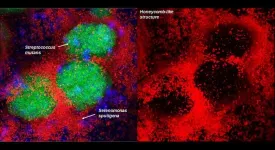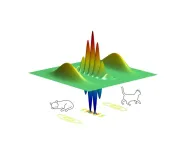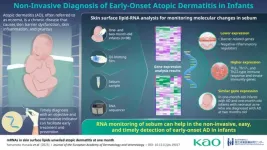(Press-News.org) Patients suffering from the “most horrible” rare brain tumour are falling through the cracks of mental health provision, University of Essex researchers have found.
A recent study which interviewed patients and clinicians discovered survivors struggle to access therapy available for other serious illnesses, such as cancer, and there was a lack of specialised support.
For the first time, the mental health of British rare brain tumour patients was examined by psychologists and now researchers are calling for urgent changes to the health service.
Dr Katie Daughters hopes her findings –published in the European Journal of Oncology Nursing - will lead to an expansion of NHS mental health services to brain tumour patients, for doctors to receive vital training and for more specialised services to be created.
Dr Daughters’ work focussed on the impact of adult-onset craniopharyngioma – which typically affects 50-74-year-old’s, although anyone older than 18 can be diagnosed with the tumour.
Craniopharyngiomas grow near the pituitary gland, a vital centre for hormone production, and the optic nerve, which is why patients often experience visual disturbances, weight increases and personality changes.
Fortunately, surgical removal of the tumour has a high survival rate, but the intrusive treatment can be just the beginning of a very long road.
Dr Daughters discovered that after physical treatment patients struggled to receive therapy or counselling – despite the illness causing widespread psychological difficulties.
Dr Daughters said: “Most people have never heard of craniopharyngiomas, however, for those that have, they know how awful these tumours can be.
“An experienced neurosurgeon who took part in the study described these tumours as ‘about the most horrible condition I look after’, while patients reported that they ‘don't feel like I'm the same person I was before the diagnosis’.
“We understand that patients suffer a poorer quality of life, but until now, we haven’t actually asked patients, and the people who treat them, how the tumour has impacted their lives outside of hospital.
“What we learned is that the impact can be devastating and, importantly, this study shows they’re not receiving the psychological support they need.”
As part of the study, Dr Daughters interviewed patients and doctors at the frontline of the rare condition.
Dr Daughters discovered depression and anxiety were extremely common among patients with many struggling to control their emotions, sometimes crying “at the drop of a hat” or angry for no reason.
While many patients had physical symptoms – like fatigue and weight gain - it was the impact of these on their social lives and ultimately their mental health that really concerned them.
Doctors and patients all said more needed to be done to help understand the psychological impact of adult-onset craniopharyngioma, and that simply hearing other patients’ experiences would “make me feel less of a freak”.
With clinicians calling for more specialised mental health services in the long term, and to let craniopharyngioma patients access existing services currently available for cancer patients in the short term.
Dr Daughters added: “Now we have a clear picture of the kinds of strengths and difficulties adult-onset craniopharyngioma patients experience in their day-to-day lives, we can design further studies to examine these processes and ultimately design new interventions to improve the social lives of these patients.”
END
'Most horrible’ brain tumor patients falling through healthcare cracks, study shows
2023-06-08
ELSE PRESS RELEASES FROM THIS DATE:
Discovering cell identity: $6 million NIH grant funds new Penn Medicine research to uncover cardiac cell development
2023-06-08
PHILADELPHIA— Historically, scientists have studied how cells develop and give rise to specialized cells, such as heart, liver, or skin cells, by examining specific proteins. However, it remains unclear how many of these proteins influence the activity of hundreds of genes at the same time to turn one cell type into another cell type. For example, as the heart develops, stem cells and other specialized cells will give rise to heart muscle cells, endothelial cells (lining of blood vessels), smooth muscle cells, and cardiac fibroblasts. But the details of this process remain mysterious.
As a result of a $6 million, seven-year ...
Penn Dental Medicine collaboration identifies new bacterial species involved in tooth decay
2023-06-08
Philadelphia — Collaborating researchers from the University of Pennsylvania School of Dental Medicine and the Adams School of Dentistry and Gillings School of Global Public Health at the University of North Carolina have discovered that a bacterial species called Selenomonas sputigena can have a major role in causing tooth decay.
Scientists have long considered another bacterial species, the plaque-forming, acid-making Streptococcus mutans, as the principal cause of tooth decay—also known as dental caries. However, in the study, which appeared 22 May in Nature Communications, the Penn Dental Medicine and UNC researchers showed that S. sputigena, previously associated ...
Team finds reliable predictor of plant species persistence, coexistence
2023-06-08
CHAMPAIGN, Ill. — Like many ecological scientists, University of Illinois Urbana-Champaign plant biology professor James O’Dwyer has spent much of his career searching for ways to measure and predict how specific plant communities will fare over time. Which species in a diverse population will persist and coexist? Which will decline? What factors might contribute to continuing biodiversity?
In a new study reported in the journal Nature, O’Dwyer and his colleague, U. of I. graduate student Kenneth Jops, report the development of a method for determining ...
Scientific Symposium - Improving pediatric cancer care by scientific excellence - Princess Máxima Center for pediatric oncology - Utrecht, the Netherlands
2023-06-08
The Princess Máxima Center's Board of Directors, Research management and the clinical directors warmly invite you to attend our interdisciplinary symposium, to celebrate the first five years existence of the Princess Máxima Center for Pediatric Oncology.
This 2-day Scientific Symposium will take place on June 12th and 13th 2023 in the Jaarbeurs in Utrecht. There will be presentations from well-known speakers covering the various disciplines within the field of pediatric oncology and beyond, showcasing latest developments and technologies.
This event will create ...
Connecting the dots: Leveraging information to improve the nation’s public health
2023-06-08
INDIANAPOLIS – The pandemic has placed a spotlight on public health -- its workforce, infrastructure and underlying information systems designed to collect, analyze and manage public health data.
Informatics, health information technology and public health experts from across the nation convened at an American College of Medical Informatics symposium concluded that how information is received and shared by public health agencies is overdue for “a strategically designed, technology-enabled, information infrastructure for delivering day-to-day essential public health services and to respond effectively to ...
Schrödinger’s cat makes better qubits
2023-06-08
Quantum computing uses the principles of quantum mechanics to encode and elaborate data, meaning that it could one day solve computational problems that are intractable with current computers. While the latter work with bits, which represent either a 0 or a 1, quantum computers use quantum bits, or qubits – the fundamental units of quantum information.
“With applications ranging from drug discovery to optimization and simulations of complex biological systems and materials, quantum computing has the potential to reshape vast areas of science, industry, and society,” says ...
A novel way to diagnose early-onset atopic dermatitis using sebum
2023-06-08
Eczema is an inflammatory skin condition that often affects infants as young as one to two months. Among the various types of eczema seen in infants, early-onset atopic dermatitis (AD), characterized by psychological stress and sleep disorders, is particularly concerning. Studies have, in fact, identified that if left untreated, AD can increase the risk of allergic diseases such as food allergies and asthma—a progression also known as the “atopic march”. Early diagnosis and intervention of early-onset AD is needed to ensure the infant’s psychological and physical ...
Aviation turbulence strengthened as the world warmed — study
2023-06-08
The skies aircraft fly through are bumpier today than four decades ago, scientists have found, after producing a new analysis showing that turbulence has increased as the climate changed.
New research from the University of Reading shows that clear-air turbulence, which is invisible and hazardous to aircraft, has increased in various regions around the world.
At a typical point over the North Atlantic – one of the world’s busiest flight routes – the total ...
Giving parents better school quality data encourages them to consider less affluent, less white schools -- To a Point
2023-06-08
Washington, June 8, 2023—For years, parents looking for data to compare the academic quality of schools for their children had one primary measure to turn to: average student scores on standardized tests. However, these scores are often related to factors that have nothing to do with instructional quality—such as family income or racial and ethnic background—and push parents toward schools that are Whiter and more affluent, exacerbating school segregation in the U.S. As a result, many education ...
UMass Amherst epidemiologist updates and validates ‘gold standard’ of prenatal physical activity tools
2023-06-08
A University of Massachusetts Amherst public health researcher has updated and validated the widely used Pregnancy Physical Activity Questionnaire (PPAQ) to improve the measurement performance of this self-report physical activity method.
Lisa Chasan-Taber, professor and chair of biostatistics and epidemiology, and her research group used novel and innovative tools – an advanced accelerometer and wearable camera – to assess PPAQ performance. The researchers developed the PPAQ in 2004 as the first validated pregnancy physical activity questionnaire. Listed on the UMass Amherst timeline ...






